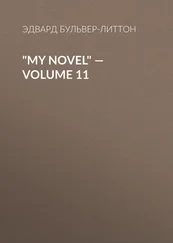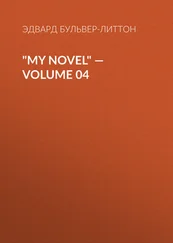Эдвард Бульвер-Литтон - My Novel — Complete
Здесь есть возможность читать онлайн «Эдвард Бульвер-Литтон - My Novel — Complete» — ознакомительный отрывок электронной книги совершенно бесплатно, а после прочтения отрывка купить полную версию. В некоторых случаях можно слушать аудио, скачать через торрент в формате fb2 и присутствует краткое содержание. Жанр: foreign_prose, literature_19, Европейская старинная литература, foreign_antique, на английском языке. Описание произведения, (предисловие) а так же отзывы посетителей доступны на портале библиотеки ЛибКат.
- Название:My Novel — Complete
- Автор:
- Жанр:
- Год:неизвестен
- ISBN:нет данных
- Рейтинг книги:5 / 5. Голосов: 1
-
Избранное:Добавить в избранное
- Отзывы:
-
Ваша оценка:
- 100
- 1
- 2
- 3
- 4
- 5
My Novel — Complete: краткое содержание, описание и аннотация
Предлагаем к чтению аннотацию, описание, краткое содержание или предисловие (зависит от того, что написал сам автор книги «My Novel — Complete»). Если вы не нашли необходимую информацию о книге — напишите в комментариях, мы постараемся отыскать её.
My Novel — Complete — читать онлайн ознакомительный отрывок
Ниже представлен текст книги, разбитый по страницам. Система сохранения места последней прочитанной страницы, позволяет с удобством читать онлайн бесплатно книгу «My Novel — Complete», без необходимости каждый раз заново искать на чём Вы остановились. Поставьте закладку, и сможете в любой момент перейти на страницу, на которой закончили чтение.
Интервал:
Закладка:
Dr. Riccabocca was the special favourite of Mrs. Dale, and the only person in the whole county who never put her out, by dropping in. In fact, strange though it may seem at first glance, Dr. Riccabocca had that mysterious something about him, which we of his own sex can so little comprehend, but which always propitiates the other. He owed this, in part, to his own profound but hypocritical policy; for he looked upon woman as the natural enemy to man, against whom it was necessary to be always on the guard; whom it was prudent to disarm by every species of fawning servility and abject complaisance. He owed it also, in part, to the compassionate and heavenly nature of the angels whom his thoughts thus villanously traduced—for women like one whom they can pity without despising; and there was something in Signor Riccabocca’s poverty, in his loneliness, in his exile, whether voluntary or compelled, that excited pity; while, despite his threadbare coat, the red umbrella, and the wild hair, he had, especially when addressing ladies, that air of gentleman and cavalier, which is or was more innate in an educated Italian, of whatever rank, than perhaps in the highest aristocracy of any other country in Europe. For, though I grant that nothing is more exquisite than the politeness of your French marquis of the old regime, nothing more frankly gracious than the cordial address of a high-bred English gentleman, nothing more kindly prepossessing than the genial good-nature of some patriarchal German, who will condescend to forget his sixteen quarterings in the pleasure of doing you a favour,—yet these specimens of the suavity of their several nations are rare; whereas blandness and polish are common attributes with your Italian. They seem to have been immemorially handed down to him, from ancestors emulating the urbanity of Caesar, and refined by the grace of Horace.
“Dr. Riccabocca consents to dine with us,” cried the parson, hastily.
“If Madame permit?” said the Italian, bowing over the hand extended to him, which, however, he forbore to take, seeing it was already full of the watch.
“I am only sorry that the trout must be quite spoiled,” began Mrs. Dale, plaintively.
“It is not the trout one thinks of when one dines with Mrs. Dale,” said the infamous dissimulator.
“But I see James coming to say that dinner is ready,” observed the parson.
“He said that three-quarters of an hour ago, Charles dear,” retorted Mrs. Dale, taking the arm of Dr. Riccabocca.
CHAPTER VIII
While the parson and his wife are entertaining their guest, I propose to regale the reader with a small treatise a propos of that “Charles dear,” murmured by Mrs. Dale,—a treatise expressly written for the benefit of The Domestic Circle.
It is an old jest that there is not a word in the language that conveys so little endearment as the word “dear.” But though the saying itself, like most truths, be trite and hackneyed, no little novelty remains to the search of the inquirer into the varieties of inimical import comprehended in that malign monosyllable. For instance, I submit to the experienced that the degree of hostility it betrays is in much proportioned to its collocation in the sentence. When, gliding indirectly through the rest of the period, it takes its stand at the close, as in that “Charles dear” of Mrs. Dale, it has spilled so much of its natural bitterness by the way that it assumes even a smile, “amara lento temperet risu.” Sometimes the smile is plaintive, sometimes arch. For example:—
(Plaintive.) “I know very well that whatever I do is wrong, Charles dear.”
“Nay, I am very glad you amused yourself so much without me, Charles dear.”
“Not quite so loud! If you had but my poor head, Charles dear,” etc.
(Arch.) “If you could spill the ink anywhere but on the best tablecloth, Charles dear!”
“But though you must always have your own way, you are not quite faultless, own, Charles dear,” etc.
When the enemy stops in the middle of the sentence, its venom is naturally less exhausted. For example:—
“Really, I must say, Charles dear, that you are the most fidgety person,” etc.
“And if the house bills were so high last week, Charles dear, I should just like to know whose fault it was—that’s all.”
“But you know, Charles dear, that you care no more for me and the children than—” etc.
But if the fatal word spring up, in its primitive freshness, at the head of the sentence, bow your head to the storm. It then assumes the majesty of “my” before it; it is generally more than simple objurgation,—it prefaces a sermon. My candour obliges me to confess that this is the mode in which the hateful monosyllable is more usually employed by the marital part of the one flesh; and has something about it of the odious assumption of the Petruchian paterfamilias—the head of the family—boding, not perhaps “peace and love, and quiet life,” but certainly “awful rule and right supremacy.” For example:—
“My dear Jane, I wish you would just put by that everlasting crochet, and listen to me for a few moments,” etc. “My dear Jane, I wish you would understand me for once; don’t think I am angry,—no, but I am hurt! You must consider,” etc.
“My dear Jane, I don’t know if it is your intention to ruin me; but I only wish you would do as all other women do who care three straws for their husband’s property,” etc.
“My dear Jane, I wish you to understand that I am the last person in the world to be jealous; but I’ll be d—-d if that puppy, Captain Prettyman,” etc.
Now, few so carefully cultivate the connubial garden, as to feel much surprise at the occasional sting of a homely nettle or two; but who ever expected, before entering that garden, to find himself pricked and lacerated by an insidious exotical “dear,” which he had been taught to believe only lived in a hothouse, along with myrtles and other tender and sensitive shrubs which poets appropriate to Venus? Nevertheless Parson Dale, being a patient man, and a pattern to all husbands, would have found no fault with his garden, though there had not been a single specimen of “dear,”—whether the dear humilis or the dear superba; the dear pallida, rubra, or nigra; the dear suavis or the dear horrida,—no, not a single “dear” in the whole horticulture of matrimony, which Mrs. Dale had not brought to perfection. But this was far from being the case; Mrs. Dale, living much in retirement, was unaware of the modern improvements, in variety of colour and sharpness of prickle, which have rewarded the persevering skill of our female florists.
CHAPTER IX
In the cool of the evening Dr. Riccabocca walked home across the fields. Mr. and Mrs. Dale had accompanied him half-way, and as they now turned back to the parsonage, they looked behind to catch a glimpse of the tall, outlandish figure, winding slowly through the path amidst the waves of the green corn.
“Poor man!” said Mrs. Dale, feelingly; “and the button was off his wristband! What a pity he has nobody to take care of him! He seems very domestic. Don’t you think, Charles, it would be a great blessing if we could get him a good wife?”
“Um,” said the parson; “I doubt if he values the married state as he ought.”
“What do you mean, Charles? I never saw a man more polite to ladies in my life.”
“Yes, but—”
“But what? You are always so mysterious, Charles dear.”
“Mysterious! No, Carry; but if you could hear what the doctor says of the ladies sometimes.”
“Ay, when you men get together, my dear. I know what that means—pretty things you say of us! But you are all alike; you know you are, love!”
“I am sure,” said the parson, simply, “that I have good cause to speak well of the sex—when I think of you and my poor mother.”
Читать дальшеИнтервал:
Закладка:
Похожие книги на «My Novel — Complete»
Представляем Вашему вниманию похожие книги на «My Novel — Complete» списком для выбора. Мы отобрали схожую по названию и смыслу литературу в надежде предоставить читателям больше вариантов отыскать новые, интересные, ещё непрочитанные произведения.
Обсуждение, отзывы о книге «My Novel — Complete» и просто собственные мнения читателей. Оставьте ваши комментарии, напишите, что Вы думаете о произведении, его смысле или главных героях. Укажите что конкретно понравилось, а что нет, и почему Вы так считаете.












